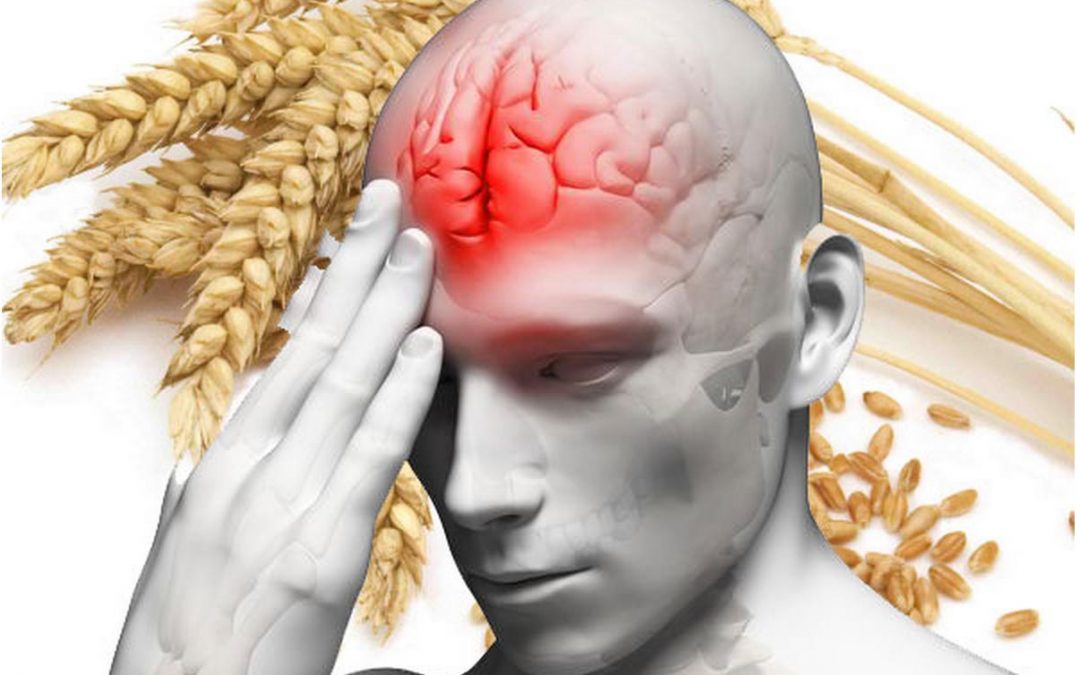‘Gluten Brain’: Wheat Cuts Off Blood Flow To Frontal Cortex
February 6, 2019
Sayer Ji, Green Med Info
Waking Times
Wheat consumption has been linked to psychiatric conditions like schizophrenia for over 60 years, but recent research indicates the mind-altering properties of this popular food are, in part, caused by it cutting off blood flow to the frontal cortex of the brain.
As far back as 1954, reports of the full or partial resolution of schizophrenia following a gluten free diet began to surface in the medical literature. I explored this remarkable phenomenon in a previous article titled, “60 Years of Research Links Gluten Grains to Schizophrenia.” While the explanation for this intriguing connection has remained focused on the disruption of the gut-brain axis and the presence in wheat of a wide range of pharmacologically active and mostly opioid receptor modulating polypeptides with glutathione-depleting properties, a new and possibly more disturbing explanation is beginning to surface: wheat consumption also cuts off blood flow to the brain.
Starting with a 1997 case study published in the Journal of Internal Medicine involving a 33-year-old patient, with pre-existing diagnosis of ‘schizophrenic’ disorder, who first came to medical attention for severe diarrhea and weight loss (classical symptoms of gluten intolerance), brain scan technology determined that cerebral hypoperfusion (decreased blood flow to the brain) was occurring within the patient’s frontal cortex.[i] A gluten free diet resulted not only in the normalization of intestinal damage and autoantibodies, but also in the return of blood flow to the frontal cortex, and the resolution of schizophrenic symptoms.
Then, in 2004, a follow up study was performed to verify if the 1997 case study was just a fluke, or perhaps a widespread effect of untreated celiac disease. Published in the American Journal of Medicine, researchers from the Institute of Internal Medicine, Catholic University, Rome, Italy, compared 15 untreated celiac patients without neurological or psychiatric disorders other than anxiety or depression, with 15 celiac patients who were on a gluten-free diet for almost 1 year, and 24 healthy volunteers of similar sex and age. All subjects underwent cerebral single photon emission computed tomography examination.
The results were remarkable, with dramatically increased incidence of impaired brain blood flow in untreated celiac patients, reported as follows:
“Of the 15 untreated celiac patients, 11 (73%) had at least one hypoperfused brain region, compared with only 1 (7%) of the 15 celiac patients on a gluten-free diet and none of the controls (P = 0.01). Cerebral perfusion was significantly lower (P <0.05) in untreated celiac patients, compared with healthy controls, in 7 of 26 brain regions. No significant differences in cerebral perfusion were found between celiac patients on a gluten-free diet and healthy controls.”
They concluded: “There is evidence of regional cerebral blood flow alteration in untreated celiac patients.”
Discussion
So, let’s take a closer look at what cerebral (brain) hypoperfusion means.
Hypoperfusion is simply decreased blood flow through an organ. Whether it is an internal organ like the kidney, a muscle or the brain, the organ will experience lower availability of oxygen (hypoxia) and nutrients, and will therefore function at a suboptimal level. Cerebral hypoperfusion, therefore, is decreased blood flow to the brain – an organ with extremely high energy demands, and upon which our entire consciousness depends.
Dr. David Perlmutter, author of the #1 New York Times bestselling book Grain Brain, has made great strides in introducing the concept to the world that grains adversely affect brain health. We know that the carbohydrate content of grains alone contribute to disrupting insulin-mediated glucose homeostasis within neurons, ultimately contributing to their suboptimal functioning and in some cases demise, but the discovery that wheat in particular has blood flow disrupting properties to the frontal cortex of the brain, has profound implications.
For example, it is know that the frontal lobe house the ‘executive functions‘ of the brain, including:
- Recognizing future consequences resulting from current actions
- Choosing between ‘good’ and ‘bad’ actions
- Overriding and suppressing socially unacceptable responses
- Retaining longer term memories which are not task-based.
- Determine similarities and differences between things or events.
If wheat consumption, through some as of yet unknown mechanism, interferes with blood flow to the brain in susceptible individuals, and as a result disrupts the executive functions of the brain, abstaining from it should be considered a reasonable precautionary behavior, assuming we wish to retain these critical functions related to morality, cognizance, and social responsibility. I explore other socio-political implications of the Western world’s several thousand year old love affaird with wheat, the ‘king of grains,’ in my essay The Dark Side of Wheat.
For additional research on the adverse health effects of wheat, read my article: Wheat: 200 Clinically Confirmed Reasons Not To Eat It or view GreenMedInfo.com’s biomedical research database on the topic: Wheat Toxicity.
Also, for more information on the brain-specific harmful effects of wheat, read the following articles or watch the video:
- The Grain That Damages The Human Brain, by Sayer Ji
- This Is Your Body (and Brain) on Gluten, by Dr. Kelly Brogan, MD
About the Author
Sayer Ji is founder of Greenmedinfo.com, a reviewer at the International Journal of Human Nutrition and Functional Medicine, Co-founder and CEO of Systome Biomed, Vice Chairman of the Board of the National Health Federation, Steering Committee Member of the Global Non-GMO Foundation.
Additional References
[i] A De Santis, G Addolorato, A Romito, S Caputo, A Giordano, G Gambassi, C Taranto, R Manna, G Gasbarrini. Schizophrenic symptoms and SPECT abnormalities in a coeliac patient: regression after a gluten-free diet. J Intern Med. 1997 Nov ;242(5):421-3. PMID: 9408073
Disclaimer: This article is not intended to provide medical advice, diagnosis or treatment. Views expressed here do not necessarily reflect those of WakingTimes or its staff.
**© [04/09/18] GreenMedInfo LLC. This work is reproduced and distributed with the permission of GreenMedInfo LLC. Want to learn more from GreenMedInfo? Sign up for the newsletter here http://www.greenmedinfo.com/greenmed/newsletter.**









